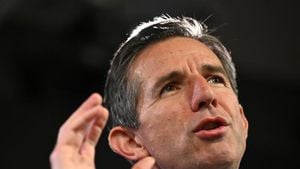Massive international concern has erupted over Israel's continued military actions in Gaza, igniting protests, intense diplomatic discussions, and humanitarian crises. The recent escalation of hostilities has resulted not only in widespread loss of life but also severe humanitarian suffering for those caught in the crossfire. With over 2 million people affected, the plight of civilians in Gaza has drawn significant international scrutiny, prompting various global responses.
Following Israel's military offensive, multiple countries have voiced their concerns. The United Nations has been particularly vigilant, with key officials warning against what they describe as potential acts of "ethnic cleansing". This term has gained prominence as both Israeli and Palestinian commentators, along with foreign officials, describe Israel's actions as attempts to forcibly remove Palestinians from their land. Josep Borrell, the European Union's chief diplomat, has tweeted about the increasing use of the term, indicating its seriousness. The term "ethnic cleansing" itself refers to actions aimed at making a region ethnically homogeneous, often involving forceful displacement and violence.
Reports indicate Israel has completely blocked humanitarian aid from entering northern Gaza, compounded by extensive bombardments of civilian areas, including refugee camps. This blockade has prompted numerous humanitarian organizations to issue stark warnings about the imminent famine and humanitarian disaster looming over the region. According to official estimates, anywhere from 69,000 to 100,000 people remain stranded without sufficient access to food and medical care, leading many to question whether the term "ethnic cleansing" applies to the current situation.
Academic perspectives lend weight to the discussion. Legal scholars have critiqued the use of the term “ethnic cleansing” as being somewhat diluted compared to the more politically charged term “genocide”. Heidi Matthews, assistant professor of law at York University, pointed out the differences between the two terms, noting how acknowledging acts of genocide triggers global legal obligations for countries to intervene to stop such actions. This distinction raises urgent questions about the actions of the international community and their responsibilities concerning the events transpiring in Gaza.
On the humanitarian front, there’s been no let-up as international aid groups have escalated their calls for urgent intervention. A coalition of eight prominent aid organizations criticized Israel's inadequate response to U.S. demands for increased humanitarian aid. The Biden administration had previously warned Israel to ramp up its aid efforts within 30 days or face consequences, including reduced military assistance. Yet, as the deadline passed and reports surfaced detailing the dire conditions worsening by the day, discussions turned heated.
The U.S. administration's approach has drawn ire as it appears to prioritize military support over human rights rhetoric. Secretary of State Antony Blinken acknowledged Israel's progress concerning humanitarian concerns, yet acknowledged three major unresolved issues. These include allowing refugees to return to previously evacuated areas, facilitating the entry of commercial goods, and pausing military operations enough to allow humanitarian aid to reach those in desperate need. Despite these discussions, fundamental challenges remain, particularly as conflict continues unabated.
The situation is complicated by the geopolitical dynamics of the region. Countries like Turkey and Egypt find themselves balancing their foreign policies amid rising public outcry against the perceived complicity of governments supporting Israel. Morocco particularly stands out; its recent decision to allow the docking of U.S.-flagged vessels carrying arms to Israel had residents and activists expressing outrage. This has led to significant public demonstrations against the Moroccan government, reiteratively declaring their opposition to any form of support to Israel.
Social media and public sentiment have played key roles during this crisis. Many Moroccans have taken to platforms to voice their disdain for their government’s actions, accusing it of betraying the Palestinian cause. The grassroots movement Boycott, Divestment, Sanctions (BDS) has also intensified its campaign, urging citizens to hold their government accountable for its foreign policy decisions and demanding the cessation of military equipment transfers to Israel.
Meanwhile, Morocco's government finds itself walking a tightrope, maintaining diplomatic relations with Israel following normalization agreements yet facing internal and external pressures to condemn Israeli military actions. Former Prime Minister Abdelillah Benkirane, representing the opposition, called for transparency from the government, urging it to communicate openly with citizens about the nation's involvement and its policy concerning the Gaza conflict.
While Israel's actions continue to escalate, humanitarian conditions deteriorate, and political pressure mounts, the world awaits clear and decisive actions from governments around the globe. The UN Security Council is currently discussing resolutions demanding unconditional ceasefire and unhindered access for humanitarian aid supplies. The urgency of these discussions cannot be overstated, as every passing day underlines the increasingly dire circumstances facing people on the ground.
Across the international stage, reactions range from condemnation to calls for support to those suffering. The voices of anger directed at governments aiding Israel underline the unrest brewing over perceived complicity and disregard for human rights as the world witnesses actions described starkly by many commentators as echoing the language of genocide. Each of these narratives intertwines to paint a complex picture of urgent humanitarian need, political turmoil, and societal responses grappling with deeply entrenched issues.
Experts warn of the challenges moving forward as diplomatic efforts attempt to negotiate peace. Nonetheless, they caution against the historical backdrop of international responses to humanitarian crises, reminding us of the costly lessons learned from previous conflicts. The stakes have never been higher; as negotiations and political maneuvers continue, the humanitarian crisis intensifies, pressing urgent calls for intervention to alleviate the suffering of those trapped amid the fray of violence.
While stakeholders and governments craft their responses, the voices of the oppressed continue to resonate, amplifying demands for justice and preservation of life. The upcoming weeks could prove pivotal as the globe watches how leaders choose to address the anguish of the millions affected directly by this enduring conflict.



